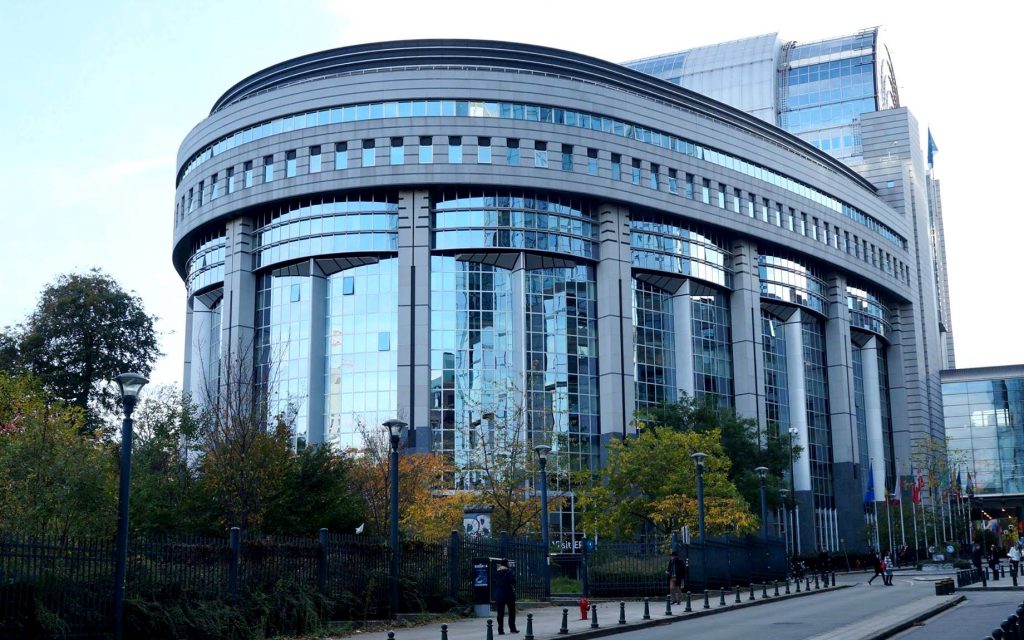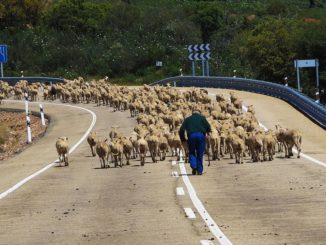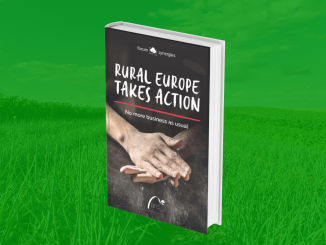
Oliver Moore and Matteo Metta
With the summer recess rapidly becoming a distant memory, EU parliament discussions on CAP are being relaunched this week. We look at the new dynamic, what’s expected from the new round of negotiations, and what issues are on the table for now.
CAP inter-committee talks derailed
The Parliament is supposed to have a position established by a plenary vote to enter into the three way (trilogue) negotiations with Council and the European Commission.
Because the CAP files did not reach plenary by the 2019 EU parliament elections in May 2019, they were carried over in the “unfinished business” rule from the previous mandate to the next. In April 2019 there were votes on the CAP strategic plans regulation in the two relevant committees – the Agriculture and Environmental Committees, or “com AGRI” and “com ENVI”.
Historically AGRI has been the main relevant committee when it comes to CAP. However, after a long, hard fought battle, ENVI won joint competence on key environmental articles. Despite this, in practice, AGRI has largely ignored ENVI’s position, even in areas of joint competency. Both committees agreed to bring their two positions closer together to avoid a chaotic plethora of plenary amendments, so achieving a more coherent Parliament position.
But this AGRI-ENVI negotiation dynamic, stalled somewhat by Covid-19, didn’t work. The coordinators representing each political group in ENVI decided to halt the talks and, after a cooling off period in a very hot summer, a new negotiating process is being attempted, involving the political groups themselves rather than the committees.
Although at the time leading figures in the AGRI committee claimed to be shocked and surprised by the dramatic derailing of talks, this level of denial seemed disingenuous to the outside observer.
ENVI committee’s Political Group coordinators had dramatically pulled the plug on talks in July when they saw their committee’s position, voted April 2019, being systematically stripped out of the alternative plenary compromises being reached between the AGRI-ENVI shadows.
Central to this was the changed posture of the newly formed Renew political group (RE, formerly ALDE), which had been acting as kingmakers up to that point. The group had been painstakingly thrashing out a common group position over Spring and Summer. There is a tension inherent to the group: one side supports a more large scale, agri-industry and business-as-usual approach, including the group’s ENVI and AGRI shadows on the CAP strategic plans regulation file, while others have what could be considered more progressive positions on climate and environment.
An example of this was a shift from slashing many of the conditionality rules from annex III of the CAP Strategic Plan Regulation, supposedly to make space for ecoschemes. This had found a majority support with AGRI members of the largest group, the centre right EPP (European People’s Party); ALDE (the previous incarnation of the Liberal group, Renew), the right wing European Conservative and Reformers (ECR) and the far right Identity and Democracy (ID), as well as some others. This position was incorporated into AGRI position after the April 2019 vote on Herranz-Garcia’s report. It was criticised at the time for rolling back an environmental CAP, by switching from a universal uptake of basic good farming practices to schemes where uptake would be voluntary for farmers with a far smaller geographical spread.
But as the newly formed Renew Europe group (RE) reached new positions on this and other issues, the game-plan shifted. It was after all RE that placed the item on the agenda of the ENVI coordinators as “any other business”, to discuss how the ENVI position was being systemically stripped away. Ironically, at the same time in the then-ongoing inter-committee talks, RE had just proposed a less brutal approach on conditionality rules and their relation with ecoschemes.
Inter-group talks and a tight timetable
RE’s presentation of a new Group position on many issues, rather than simply taking the shadows’ position, has placed a new emphasis on the other Groups coming forward with their own positions. Although RE’s position was said to be still incomplete last week, with a few outstanding items to be agreed, midsummer’s events had prompted other groups to also come forward with their own positions on the whole CAP Strategic Plan Regulation.
These positions are supposedly agreed by the whole of each political group, in order to be used in the new round of inter-Group talks which aim to reach alternative compromises for the plenary vote, which had been previously planned for the end of October.
Without liaising with the ENVI committee, the AGRI coordinators decided on 3rd Sept to stick to their previous objective of getting all the CAP files to plenary vote in October. The majority decided that the political groups would have just a week until 10th Sept to reach Group positions, while weeks 38-41 (14th Sept. to 9th Oct.) would be used to negotiate alternative compromises for the plenary vote in week 42 (starting 19th Oct). This four week window has already been dubbed unrealistic for any meaningful change, especially given the very contentious issues still left to be discussed this parliamentary mandate, including:
- Capping (mandatory or voluntary, threshold, inclusion of tax and labour costs, e.g. an employment top-up to avoid offsetting);
- Distribution of funds per intervention (programme) especially in the direct payment pillar (Pillar One) and the percentage assigned for ecoschemes, and ring-fencing for climate/environment;
- Ecoschemes – how will they work (are farmers paid the same for taking up one or many ecoschemes? Will there be a menu approach?);
- Conditionality rules for all farmers and especially how they fit together with ecoschemes (called the ‘green architecture’).
- Rural development, including areas of natural constraints, risk management schemes, investments.
- Coupled payments and sectoral programmes, and promotion (e.g. of meat and champagne)
- Governance including transparency and consultation for drafting CAP strategic plans.
- Performance including indicators, and budget tracking e.g. climate expenditure.
Exclusion logic
There has been a process of excluding potentially progressive voices in the current process. The email calling for Group submissions of their positions didn’t mention the ENVI coordinators or shadows. Similarly, a subsequent correspondence by the CAP Strategic Plans Regulation rapporteur Peter Jahr outlining the ”ambitious” timetable and issues to be discussed neither included the left group European United Left–Nordic Green Left (GUE-NGL) or ID, nor the ENVI committee, angering the GUE-NGL and the ID groups’ AGRI shadows.
Instead, rapporteur Jahr apparently preferred to use a smaller, more exclusive grouping to “work constructively” and “more effectively” in the ’”short and ambitious timeframe” available. Insiders are speculating about the validity and logic of a closed process that limits voices critical to the dominant, input-intensive status-quo view of agriculture, minimising and isolating the progressive participants involved.
Observers have speculated that this can not simply be an approach excluding the smaller groups, as ECR is considerably smaller than ID, Greens and GUE-NGL, yet it has consistently sided with the EPP so far. If it was about excluding the ‘extremes’ at far left and far right this then isn’t happening: GUE-NGL have been shown to be serious, constructive players with considerable expertise, yet their position is perceived as very close to the Greens, and there are also many far right elements in the ECR group.
The irony is that in fact the GUE group supported more of the Herranz-Garcia report in AGRI’s 2019 vote than did the Greens. Perhaps the Greens are being courted for their “green light” – to give a stamp of approval to a highly contentious agreement or to add credibility to a rotten process?
In any case, the approach to close ranks selectively and pre-cook the file, weakening or excluding critical voices arguably shows once again that the business as usual crowd leading the show in AGRI are neither even-handed nor willing to grasp the nettle of real environmental change.
An “ambitious”/ “unrealistic” timetable
The 4-week negotiating window is intended by the EPP rapporteur to include 2 shadows meetings. The first week of discussions will involve the green architecture: a new idea being pushed by the EPP on a “global environmental budget”, conditionality including social dimension of CAP, eco-schemes including the RE idea of ‘’enhanced eco-schemes’’, and the menu approach. The second week would then focus on rural development (“pillar 2”) especially Articles 65/66/67. The 3rd week would add sectoral interventions, while the 4th would wrap up outstanding issues including the global environmental budget.
The social dimension in conditionality (annex III Strategic Plan Regulation) has become prominent in the agenda of talks: it was originally an idea from NGO European Coordination of la Via Campesina, which GUE and Greens-EFA took up but it was dropped early on as a minority view. But after the spread of Covid-19 and all the cases and even deaths in meat processing units, among migrant or undocumented workers operating in poor labour conditions especially in Germany, the S&D’s Maria Noichl came forward just before the breakdown of the previous talks with a “red” (rather than green) conditionality idea, which may now be taken up.
The contentious capping and distribution of first pillar money does not feature in the provisional timetable seen by ARC2020 but neither does a discussion on what is considered open for (re)negotiation.
Little progress in the first meeting of the exclusive, “more constructive” gathering
The first meeting of the smaller, more exclusive constellation yesterday (15.09.2020) has reportedly yielded little, as discussions were centred around those absent: S&D and Green-EFA strongly argued for a transparent and inclusive process, to include GUE in particular. ARC2020 can confirm a vote was even forced on whether to involve GUE, which the rapporteur refused to be weighted by size of group in the assembly: EPP, RE and ECR all refused to involve GUE-NGL, with RE’s spokesperson Hlaváček reportedly even stating that if GUE joined, RE would leave. At the time of writing, Group positions are only fully ready for the Greens and a 2-pager from EPP, while 6 of the 7 chapters of the RE position is complete, ECR’s is said to be ready but not published/shared, with RE, S&D and GUE positions to be ready on the 16th September.
Probable make-up of the negotiation teams
Presumably ENVI shadows and coordinators can still be included in the negotiation teams being drawn up in each of the political group. ARC2020 has the following tentative information on their make-up, as of time of writing.
EPP
Core team:
Peter Jahr (SPR rapporteur, DE)
Christophe Hansen (ENVI rapporteur, LU)
Wider team:
Herbert Dorfman (AGRI coordinator, IT, German-speaking minority)
Peter Liese (ENVI coordinator, DE)
(?) Anne Sander (AGRI MEP, EP bureau & questor, FR)
Norbert Lins (AGRI chair, DE)
S&D Group
Core team:
Maria NOICHL (AGRI shadow, DE)
Günther SIDL (ENVI shadow, AT)
Wider team:
Miriam DALLI (Vice chair of SD group responsible for agriculture, MT)
Paulo DE CASTRO (AGRI coordinator, IT)
Jytte GUTELAND (ENVI coordinator, SW)
Renew
Core team:
Martin Hlaváček (AGRI co-shadow, CZ)
Jérémy Decerle (AGRI co-shadow, FR)
Jan Huitema (ENVI shadow, NL)
Ulrike Muller (AGRI coordinator, also CAP FMM reg. rapporteur, DE)
Nils Thorvald (ENVI coordinator, FI)
Pascal Canfin (ENVI chair, FR)
Dacian Cioloş (group leader, RO)
ID
Gilles Lebreton (AGRI shadow, FR)
Greens
Martin Häusling (AGRI coordinator and shadow, DE)
Bas Eickhout (ENVI coordinator and shadow, NL)
GUE-NGL
Luke Flannagan (AGRI coordinator and shadow, IR)
Mick Wallace (ENVI shadow, IR)
ECR
Bert-Jan Ruissen (AGRI shadow, NL)
(?) Zbigniew Kużmiuk (AGRI coordinator, PL)
More on CAP from ARC2020
Latest
CAP | Kloeckner Launches Direct Attack on GAEC 9, Eco-Schemes and Green Deal
ARC2020’s CAP Strategic Plans Project
How Transparent and Inclusive is the Design Process of the National CAP Strategic Plans?
Climate and environmentally ambitious CAP Strategic Plans: Based on what exactly?
CAP & the Global South: National Strategic Plans – a Step Backwards?
CAP and EU Green Deal
European Green Deal | Revving Up For CAP Reform, Or More Hot Air?
Civil Society and Scientific Criticism of CAP
Commission’s Dodgy Calculations Improve CAP’s Climate Impact
EU Subsidies Benefit Big Farms While Underfunding Greener and Poorer Plots – New Research
ENVI and CAP
CAP | Will Some Power be Wrestled away from Agri Committee this week?
Environment Committee Gains Right to Bring CAP Amendments to Plenary
CAP | Will Environment Committee Flex its New Found Muscles?
AGRI and CAP
Council and CAP
Auditors Criticism of CAP
CAP | Billions Spent on Biodiversity with Little Impact – Auditors
Auditors – Measures to Stabilise Farmer Incomes have ‘limited effect’
ARC Exclusive – Auditors Heavily Criticise Commission’s CAP Plans
CAP and Biodiversity | Wake-Up Call For Green Deal Commission?
CAP Extra





